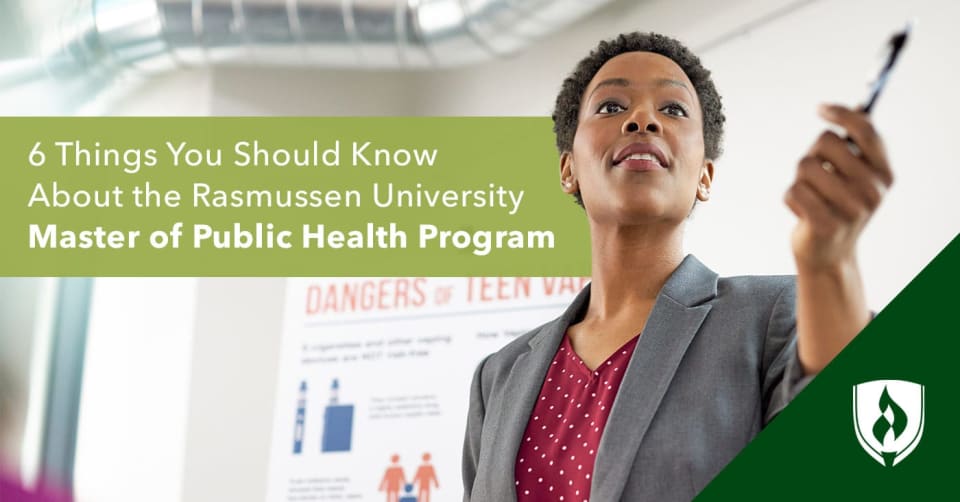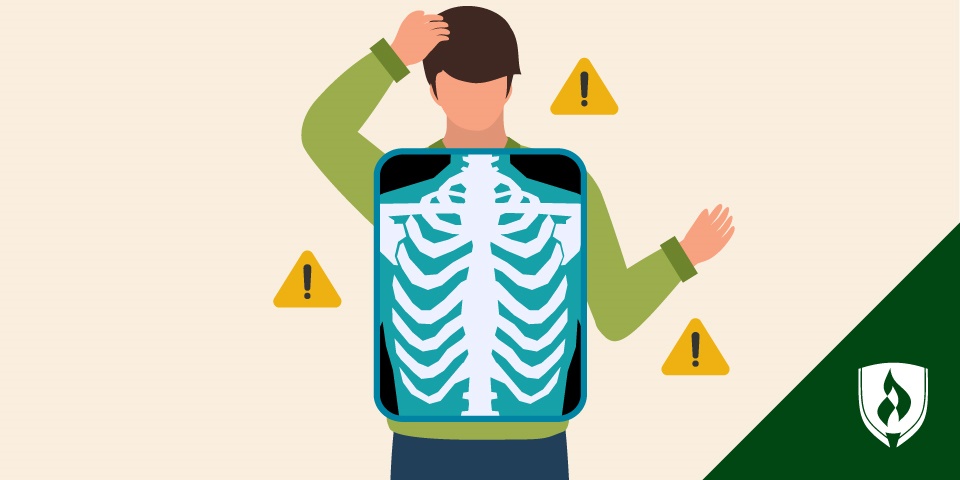6 Things You Should Know About the Rasmussen University Master of Public Health Program
By Kirsten Slyter on 08/31/2020

Public health has always been an important field. But with recent events like the COVID-19 pandemic upending the world, it’s taken on an increasingly prominent position in the minds of the public and healthcare professionals.
It’s clear that the world needs well-prepared public health professionals in a wide variety of disciplines including epidemiology, health education, community health, health policy and global health to help tackle the large scale health challenges communities are facing across the globe. If you’re looking to better position yourself for success in one of these roles, earning a Master’s degree in Public Health can be an appealing option.
You’re looking for a program that will prepare you to make a widespread difference and fit into your life right now. While we can’t speak to all the public health programs out there, we can speak to ours—so let’s dive right into it.
What you should know about the Rasmussen University Master of Public Health program
Curious about what can you expect from the Master of Public Health program at Rasmussen University? We’ve highlighted 6 factors you’ll want to know.
1. Coursework is designed to develop well-rounded public health professionals
The MPH curriculum at Rasmussen University was designed by faculty and curriculum design professionals to provide students opportunities to develop and hone essential competencies for public health leaders. That includes a focus on:
- Refining the ability to think systematically about the design and implementation of public health programs
- Working as part of a multidisciplinary team of public health professionals
- Understanding the benefits and limitations of health data collection
- How to analyze and interpret data when crafting policy or programs
- Understanding how cultural factors influence public health policy
- Applying epidemiological methods of assessment
These competencies will provide a strong and broad foundation for public health professionals to build upon in their careers—whether that’s as the director of a community health non-profit organization, a member of the research community or as a health policy analyst. No matter your ultimate goal, this program will have you well-positioned for several critical public health careers.
2. 100 Percent online competency-based education courses can help you maintain your busy life while earning your MPH
While you can find support in person at campus locations across the nation, the Rasmussen University MPH program is offered completely online. This program was designed with students who are working full- or part-time in mind—and the fully-online competency-based education format aims to provide flexibility you may not find elsewhere. So how does it help? At the start of each term, you’ll have all of the course materials, information and assignments available to you right away and your only deadline is to have everything completed by the end of the term. That means you’ll have a much greater degree of control—if you want to “work ahead” one week to help balance out another that may be busier, you can! And if something unexpected pops up, you have the option to make up for it later without being penalized.
That doesn’t mean your experience will be an entirely independent undertaking. You’ll have opportunities to regularly interact with students and faculty during live sessions that are also recorded and posted for later viewing. Additionally, your instructors will check in to make sure you’re on track and progressing through your work at a manageable pace.
So what will you be learning in this format? Here are a few of the key courses you can expect:
- Epidemiology for Public Health Professionals
- Public Health Leadership
- Healthcare Policy, Ethics, and Laws
- Environmental Health and Emergency Preparedness.
These courses all feature project-based learning that will incorporate key concepts into deliverables that that reflect the real work of public health professionals. This results in an effective blend of both learning the theory behind public health policy and learning how it can be applied in practice.
3. You’ll explore your options in your public health practicum
Public health is meant to be practical. Though the education you gain in the classroom will give you a foundation for public health practice, you won’t have to wait until after graduation to start building practical experience. Within the MPH program, you’ll have opportunity to explore different sectors of public health through an MPH practicum and capstone. In the practicum, you’ll gain 120 hours of experience working with an organization on a public health project. Potential practicum sites may include:
- Hospitals and clinics
- Non-profit organizations
- Eldercare facilities
- Community centers
- Government agencies
You’ll apply what you’ve learned in your courses, develop and present reports, and practice research methods. Depending on the exact project, you’ll have the opportunity to gain skills in areas like risk management, emergency preparedness and health education in addition to gauging your own interest in that area.
Exploring these public health areas while in school may give you a head start in narrowing down your preferred public health interests as there are a wide range of options for public health professionals.
“There are some areas in public health that students may not have even considered yet,” explains professor Dr. Joyvina Evans of the Rasmussen University School of Health Sciences.
For instance, Dr. Evans explains her own experience in the field includes time spent working in medical research, assisting with clinical drug trials for conditions like heart disease, asthma, and diabetes. This experience involved coaching patients, evaluating ethical issues associated with research studies, creating documents and consent forms, and working closely with the Institutional Review Board. Like Dr. Evans, all Rasmussen University MPH faculty bring unique public health experiences and perspectives to their classrooms.
The MPH practicum will give you the opportunity to network with potential co-workers and employers while also providing you the kind of experience you can point to on your resume or show in a portfolio which will prove invaluable in future job searches. “Employers want someone with experience, not just an education,” says Dr. Evans.
4. Discussions on diversity and inclusion in public health are prioritized
Public health is a topic that affects everyone. Dr. Evans acknowledges that public health professionals often focus on topics like diabetes, obesity, and heart disease without fully considering how more abstract societal issues like institutionalized racism, poverty, and LBGTQIA discrimination can complicate how these public health issues are addressed.
The faculty and course designers for the Rasmussen University MPH program made sure that the self- assessment and awareness of these issues and how they affect health outcomes at large were built into the curriculum. “We’re having the conversations that others aren’t having,” notes Dr. Evans.
Professors will introduce relevant subjects in lectures and invite students to have discussions online and demonstrate critical thinking in their assignments. Students will also learn about socioeconomic disparities that affect housing, nutrition, environmental exposures and access to care so they can better address the needs of the communities they will work in no matter where they end up. Students will be asked to demonstrate culture awareness and self-awareness to help them navigate the diverse range interpersonal interactions they’ll encounter.
5. You’ll be supported
The MPH faculty at Rasmussen University are not just professors to the students. They also serve as mentors. “We’ve all been where the students are so we have empathy for everything they’re going through,” says Dr. Evans.
Dr. Evans recalls that as a master’s in public health student she didn’t know anyone else in the field aside from her professors so the support she received from them meant the world to her. That support is something she and other instructors aim to pay forward to students as they progress in their studies. Need career advice? Curious about a specific field in public health? Just looking for a little moral support? The faculty here can help guide you.
MPH students also have access to all of the helpful support services and offerings available to all Rasmussen University students. Not only will you have a student advisor working with you from the point of application to graduation, you’ll have access to a variety of critical student services like tutoring, library services, career services and 24/7 technology support.
“You will have the support you need at Rasmussen,” Evans emphasizes.
6. The MPH program can be completed for under $15,0001
Moving up to the next level in your education doesn’t have to come with a “next level” price tag. In fact, you can earn a Master of Public Heath degree at Rasmussen University for just under $15,000! This program price will help make the next step forward in your public health career path an affordable one.
Ready to get started on your MPH journey?
Though starting your journey to earning your Master’s in Public Health may be a big undertaking, know that you’ll be supported from application to graduation at Rasmussen University.
“Don’t let the thought of a graduate degree intimidate you. Understand that the support you need is here. You will be challenged, but with persistence and discipline, you will be able to succeed in this program,” says Evans.
Take the first step towards earning your MPH—visit the Rasmussen University Master of Public Health program page and request more information.
1Tuition for the MPH program is $205 per credit. Students in the program must maintain continuous enrollment to remain eligible for the tuition pricing of $205 per credit. A student who withdraws and re-enrolls will be required to pay the tuition price offered at the time of their re-enrollment. If a student needs to retake one or more courses in the degree program, the total cost of the program will exceed $15,000. MPH Program cost breakdown: $11,480 in tuition + $2,870 in fees = $14,350 in program cost. Program availability varies by campus and state; please see the Rasmussen University Catalog for details.




